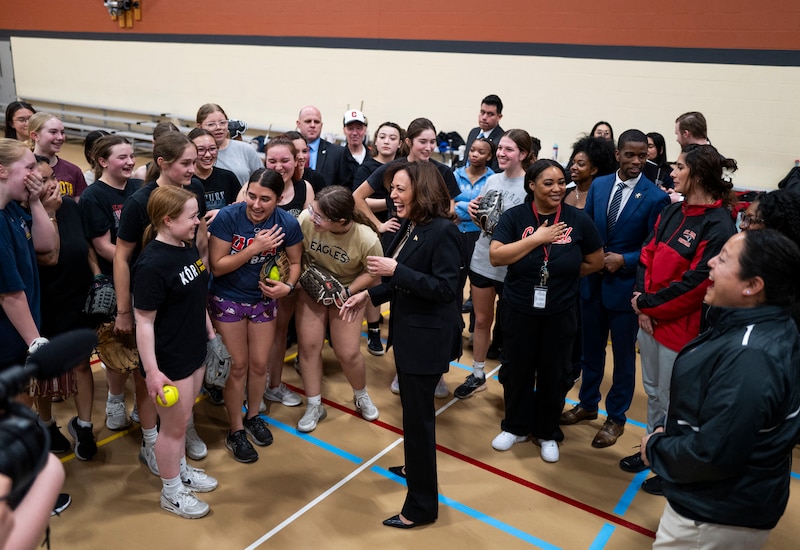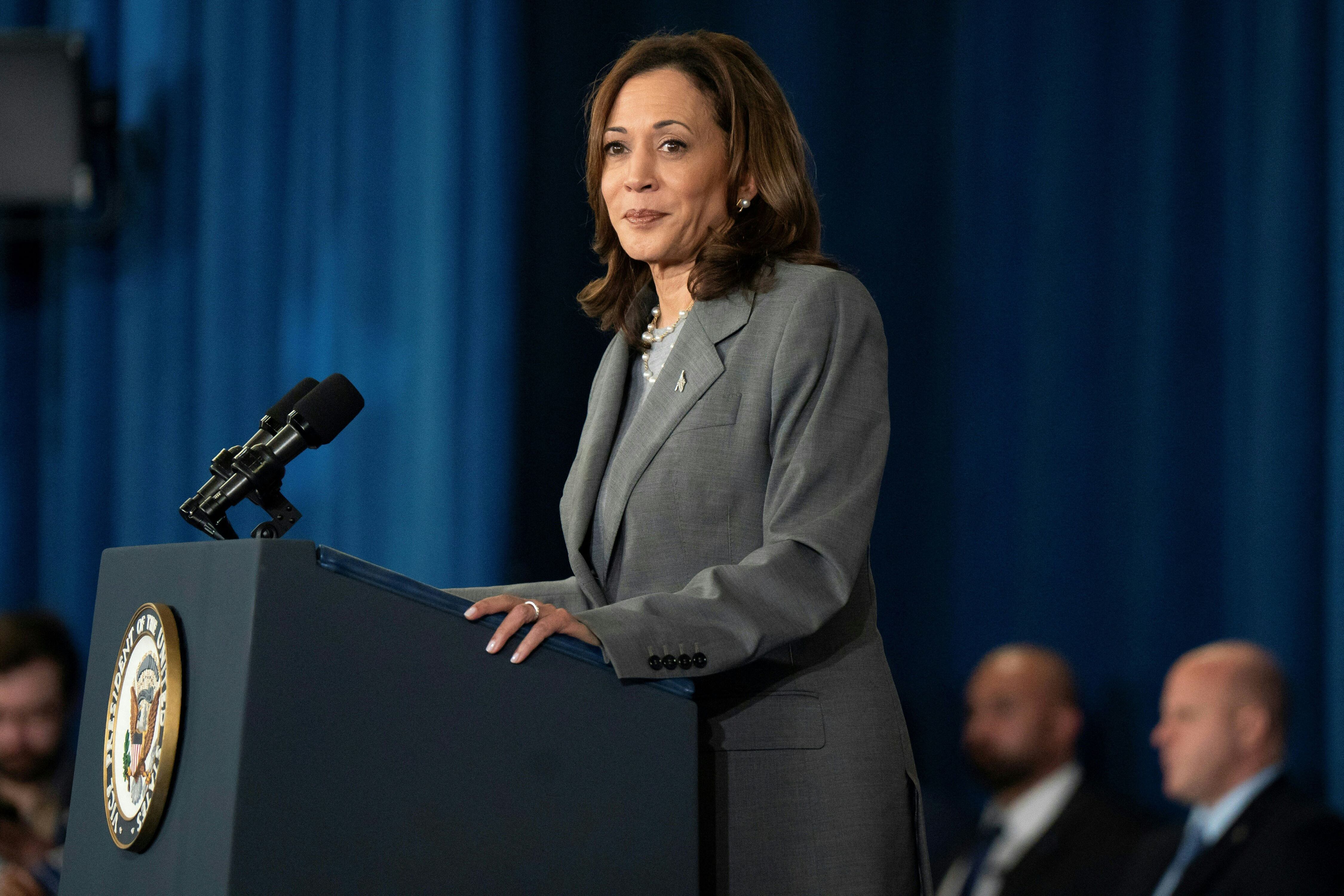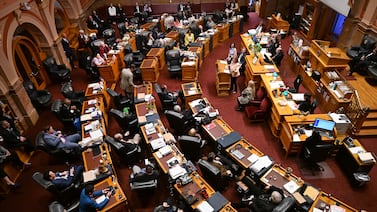Sign up for Chalkbeat’s free weekly newsletter to keep up with how education is changing across the U.S.
Vice President Kamala Harris quickly emerged as the most likely Democratic nominee for president, securing dozens of endorsements within hours of President Joe Biden announcing he would end his reelection campaign.
If Harris becomes the nominee, she’ll face a Republican opponent in former President Donald Trump who has promised to cut federal funding for schools that teach “inappropriate” lessons on race, gender, and politics, and to roll back protections for gay and transgender students.
While the economy, immigration, and foreign policy have received far more attention this election cycle, the parties differ sharply on education.
Harris almost immediately secured the endorsement of the American Federation of Teachers, the nation’s second largest teachers union. The National Education Association followed on Tuesday, with President Becky Pringle posting on X, the site formerly known as Twitter, that “Kamala has delivered for students & educators.”
Here’s what we know about Harris’ education record so far:
Harris has backed Title I, Head Start funding increases
Like Biden, Harris has called for “significant” increases to Title I, the federal program that sends money to schools serving higher shares of students from low-income families. As a presidential candidate in the last election, she also called for more funding for Head Start, which provides federally subsidized preschool to low-income children.
Biden has tried several times to pass a budget that would more than double Title I. But Congressional Republicans have blocked those proposals and pushed for dramatic cuts to the program.
That puts Harris at odds with Trump, whose education platform includes eliminating the U.S. Department of Education and giving states full control over the nation’s educational programming. Project 2025, a blueprint developed by several former Trump officials that would likely inform policy under a second Trump administration, calls for phasing out Title I and eliminating Head Start.
Harris could reenergize school desegregation efforts
One of the most striking moments during the Democratic presidential debates in 2019 came when Harris challenged Biden about his record on school desegregation. Biden had opposed busing children to attend different schools under a court order, and Harris raised her personal experience as a child who took part in a voluntary integration program in Berkeley Public Schools.
“There was a little girl in California who was a part of the second class to integrate her public schools and she was bused to school every day,” Harris said in 2019. “And that little girl was me.”
Given that, Harris could be an advocate for school desegregation and racial equity initiatives, though she would face stiff opposition. Congressional Republicans and Republican-controlled state legislatures have fiercely opposed diversity and equity efforts in K-12 schools and colleges in recent years.
Harris has championed the idea of giving school districts grants to fund voluntary desegregation efforts. But the Biden administration struggled to secure modest funding for a similar effort. The administration quietly launched a scaled-back version last year.
Trump, meanwhile, defunded a similar school desegregation grant program shortly after taking office, saying the initiative was “an unwise use of tax dollars.”
Harris would bring civil rights experience to Title IX
As a candidate, Harris pointed to her experience enforcing children’s civil rights as California’s attorney general, and said she would bring that to bear as president.
In 2019, she called for adding staff to the U.S. Department of Justice to enforce Title IX, the federal law that prohibits sex discrimination, and protect LGBTQ students from discrimination and harassment at school.

The Biden administration recently issued new rules that say Title IX protects students from discrimination based on sexual orientation and gender identity — an interpretation that’s drawn intense opposition from Republican officials. More than two dozen states are suing the Biden administration to block those rules, which are temporarily on hold in at least 15 of them, according to a tracker compiled by Education Week.
If elected, her administration would likely be in the position of defending those Title IX rules against any ongoing or future challenges — and may be tasked with finalizing rules about the rights of trans athletes to play on certain school teams. The Biden administration has indefinitely delayed releasing those.
Teachers would likely have a friend in Harris
Harris made raising teacher pay a centerpiece of her education platform when she was a presidential candidate. She proposed closing the pay gap between teachers and other professions that require a college degree, a move that would have meant an average raise of $13,500 a year at the time and would have cost an estimated $315 billion over 10 years. Such a proposal would have represented a major expansion of the federal role in education.
Since then, many states and districts have raised teacher pay, but those raises often have not kept pace with inflation. A recent RAND report found that in addition to earning less than their peers in other professions, teachers are also more likely to say that their pay feels inadequate. It’s among the reasons teachers cite for leaving the profession — especially Black teachers, who are already underrepresented in American classrooms.
Harris also called for a $2.5 billion investment in teacher preparation programs at historically Black colleges and universities — or HBCUs — in a bid to diversify the teaching profession. She also supported more investment in teacher residencies and “grow your own” programs, which generally provide financial support and mentoring for teachers aides, substitute teachers, and others who live in communities of color.
Roughly 80% of public school teachers are white, compared with only about half of students. Studies find that students of color taught by teachers of color are more likely to be referred to gifted programs and go to college.
Harris backed plans for free college
Harris has supported proposals to make two-year colleges free for most students and to make four-year colleges free for many students from lower- and middle-income families as both a senator and a presidential candidate.
Biden came into office with his own plans to make two years of college free for many students, but those policies failed to advance in a challenging political environment. Instead, the Biden administration pushed to expand Pell grants that reduce college costs for many students from low-income backgrounds. The bungled rollout of a new federal financial aid form means fewer students may benefit from those changes.
Public service workers’ loan forgiveness a Harris priority
As a prosecutor in California, Harris backed debt forgiveness for students defrauded by for-profit colleges. As a presidential candidate, her debt forgiveness plan was narrower than those from progressives such as Sens. Bernie Sanders and Elizabeth Warren.
But during internal Biden administration debates, Harris was reportedly an advocate for more generous relief. After the U.S. Supreme Court struck down Biden’s initial student debt forgiveness plan, the administration pursued a variety of strategies that have wiped out an estimated $168 billion in debt for more than 4 million borrowers, with a focus on public service workers such as teachers.
But Republicans have challenged portions of Biden’s plans in court, most recently securing an injunction against the Saving on a Valuable Education income-based repayment plan.
Harris seems likely to continue to pursue debt forgiveness and defend those policies against challenges. But it’s unclear how much political or legal room there is to enact broader loan forgiveness.
Editor’s Note: This article has been updated to reflect that both NEA and AFT have endorsed Kamala Harris for president.
Erica Meltzer is Chalkbeat’s national editor based in Colorado. Contact Erica at emeltzer@chalkbeat.org.
Kalyn Belsha is a senior national education reporter based in Chicago. Contact her at kbelsha@chalkbeat.org.







